|
Clive
Barker is a leading author of contemporary horror/fantasy.
Barker's distinctive style is characterised by the notion
of hidden fantastical worlds existing side by side with our
own. After being disappointed with the adaptations of his
books Transmutations (1985) and Rawhead Rex
(1986), he directed his first film, Hellraiser (1987),
based on his novel The Hellbound Heart. His short story
The Forbidden formed the basis for the film Candyman
and its two sequels. We caught up with Barker a few months before his latest project,
the video game Jericho, was due to be released in the
UK...
ReviewGraveyard:
You're
both a writer and artist. Have you supplied much of the concept
art for the games you've made?
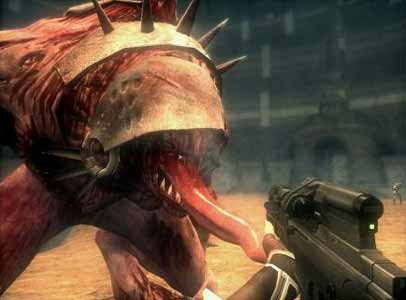 Clive
Barker:
I like to contribute both images and story to the game projects
I get involved with. Often the images are simply sketches
to illustrate my thoughts for the designers. It's certainly
useful to be able to 'talk' in both words and pictures. Clive
Barker:
I like to contribute both images and story to the game projects
I get involved with. Often the images are simply sketches
to illustrate my thoughts for the designers. It's certainly
useful to be able to 'talk' in both words and pictures.
RG:
How much of the actual gameplay elements - such as the psychically-controlled
bullets - have you contributed to Jericho?
CB:
Brian Gomez [Jericho's co-creator] and I debated from
the beginning the kinds of powers the lead characters of the
game would have.
I'm excited about the game because the story is I believe
fresh and because of that we have a greater chance of scaring
the sh*t out of the players around the world. I'd carried
the idea of Jericho around in my head before I'd even
talked to Brian about the project, so I feel very close to
it.
I'd
love people to think of Jericho the way I thought of,
let's say Alien, when that movie was about to come
out. Teased with glimpses but never given the whole monstrous
truth until the story was told on the screen. Jericho
should be the same: unique and terrifying.
I've
liked the Jericho idea since it first came into my
head because it marries up two of my passions (history and
horror). Our protagonist's journey through slices of other
times in the game. Their progress bringing them steadily closer
to the Great Adversary who sits at the centre of this Labyrinth
of Time.
RG:
Do your games tie in with your books? Are there any plans
to create an overall coherent universe?
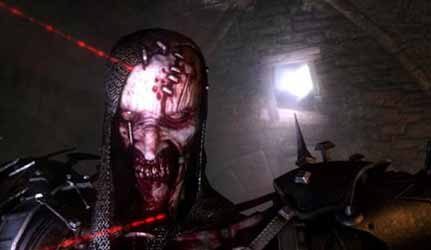 CB:
My games do not tie up with my books. At least so far. CB:
My games do not tie up with my books. At least so far.
Jericho is the first games project I've been connected
with which I really feel might be explored in novels and comic
books (I have a huge passion for comic books).
The
climaxes of my books end with apocalyptic events and unravelling
realities. There should be a taste of that same sublime destructiveness
in Jericho.
Of course the ending depends entirely on how you play the
game but one way or the other you'll get to see fire and blood.
RG:
What do you think are the advantages of videogames over traditional
art-forms such as movies or novels?
CB:
I don't think of the media in which I work (movies, books,
paintings, games) as having advantages or disadvantages when
balanced against one another. For me, it's very much a question
of mood. There are days when the only thing I want to do is
paint or write, others when I want to read or play a game.
All the media have their joys and their limitations.
RG:
What other authors have inspired you in your work?
CB:
The list of authors who have inspired me is virtually endless
but I could name Herman Melville, Edgar Allen Poe, Ray Bradbury,
William Blake, to name but a few. I am also very much influenced
by painters, the work of Francisco Goya, of Ernst Fuchs, of
James Ensor [the Belgian surrealist]. They are always there
in my head inspiring me to do better.
RG:
The game gives the impression of Lovecraft-style extra-dimensional
chambers, deliberate paradoxes that the human mind can't quite
grasp. Do you think that a game can represent this repeatedly
looped world effectively?
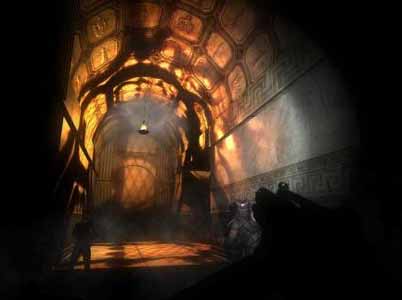 CB:
There is indeed a connection in the game to the kind of vast
architectural spaces evoked in the work of H.P. Lovecraft.
But that's where the similarity ends I think. CB:
There is indeed a connection in the game to the kind of vast
architectural spaces evoked in the work of H.P. Lovecraft.
But that's where the similarity ends I think.
Lovecraft
methodology was to continually hit at the presence of vast
unnameable and indescribable forces, which as far as I'm concerned
gets a little old after a time. There's
only so many occasions in a book when the author can tell
me that the monster was so terrible he doesn't have words
to describe it before I become irritated.
Right from the beginning of my career as an imaginer, I've
always taken great delight in presenting the reader, or in
the case of Hellraiser, the spectator, with precisely
imagined and elegantly photographed villains. I'm not interested
in a beast that the creator claims he can't show me.
RG:
There's some pretty horrific stuff in Jericho - is
there anything you would consider too violent to include in
the game?
CB:
There is indeed some intense and gory material in Jericho,
but I've always believed that one of the tasks a maker of
horror stories in any medium has is to his or her audience
into areas of Taboo; places where they would not have dared
to venture had the game not obliged them to trespass on treacherous
ground. And in so trespassing, inviting the wrath of some
creature that they have never encountered before.
RG:
What's your favourite character/creature in the game?
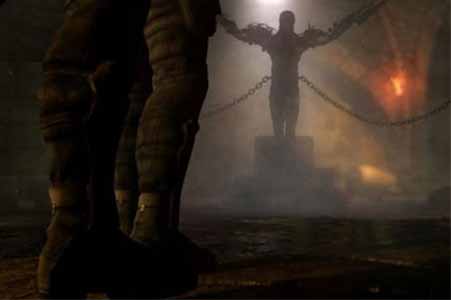 CB:
I never play favourites with characters in books or games.
Wait, that's a lie. I love the villains. Always have. Always
will. CB:
I never play favourites with characters in books or games.
Wait, that's a lie. I love the villains. Always have. Always
will.
RG:
Jericho itself is the oldest continuously occupied settlement
in the world, yet your title refers not to the historical
city but to the supernaturally talented psychic squads sent
into Al Khali to resolve the mystery throughout the ages.
How are these squads formed and bound together?
CB:
There's no doubt that if Jericho is liked by players we will
take our psychic squad out on other adventures (assuming,
of course, any of them survive). The human appetite for mystery
and terror has never waned even when, as now, the world is
filled with very real terrors.
Maybe
that's the connection. Maybe we seek out games and stories
that allow us a measure of control over the horrors of the
invented world: a control which we do not have, regrettably,
in the real world.
RG:
There are definite ultimate evils in your work but there's
little sign of good. Does this reflect something of your own
outlook on the world?
CB:
I disagree with the observation that there is little sign
of good in my work. I would point to novels like Imagica
and Weaveworld both of which have very powerful heroes
and heroines. So too, do the stories I write for all ages,
The Thief of Always for instance, has a very strong
hero called Harvey who stands up to a much stronger enemy
the way the biblical David stood up to Goliath. And in the
Abarat books, of which there are presently two of the
five novels published, there is an entire band of good guys
who surround our human heroine, Candy Quackenbush. Needless
to say, the good guys are hopelessly outnumbered, but that's
all part of the fun, isn't it?
RG:
Thank you for your time.
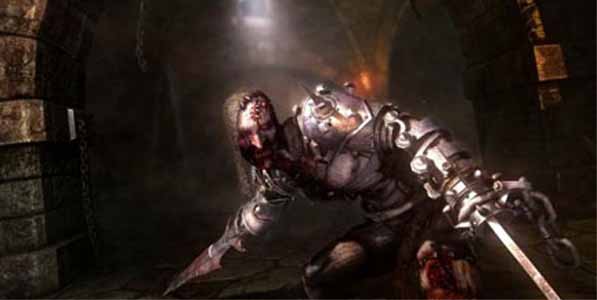
With
thanks Kate Linfoot at Way to Blue
Clive
Barker's Jericho is an overload of sensory horror shock as
players journey through hellish locations and slices of time.
The Jericho of the title refers to the Jericho Team, a seven-man
strike force that protects government interests from paranormal
threats. Trained in both conventional warfare and the arcane
arts, each Jericho Team member is an expert in different para-psychological
disciplines, including clairvoyance, alchemy, blood magic
and exorcism.
Jericho
is released by Codemasters
from 01 October 2007.
View
the trailer: Quicktime
/ Real
Media / Windows
Media
Buy
the game: PS3
/ Xbox
360 / PC
Return
to...

|